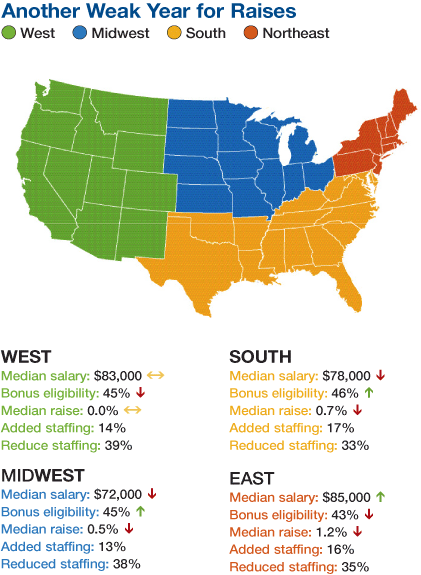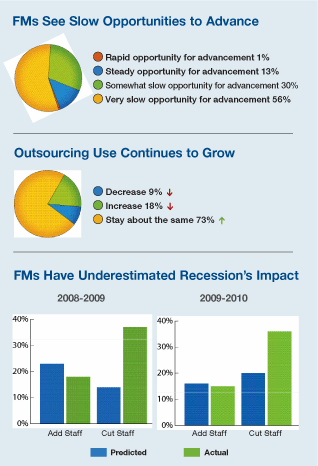FM Pulse Salary Survey Reveals Economy's Impact on FMs
It will come as no surprise that in today's economy facility managers will not advance simply by running a building well and working hard. Rather, those with an eye to moving ahead, either within their companies or elsewhere, will need the ability to contribute to solving companywide problems.
Interviews with a range of facility leaders shows that those broader contributions are likely to become more and more central to the facility manager job description. That could start to spell trouble for some facility managers. The FM Pulse survey suggests that few facility managers expect to move up quickly through the ranks. For example, 30 percent of respondents say that they see somewhat slow opportunities for advancement, while 56 percent describe their opportunities for advancement as very slow. If facility managers who don't expect to move up quickly are not tackling broader organizational issues, they may find that they are more vulnerable to downsizing or outsourcing.
Although the bar is being raised for facility managers, that's not the whole story. Facility managers are also better positioned to address organizational needs. That's because, in many companies, there has been a change in the perception of what facility managers have to offer.
"The kind of overarching change that has happened is the realization that facilities are more than a roof over the head of workers" says Art Elman, vice president of corporate real estate at ADP. "A facility is not just a cost center but an opportunity center, and that is what has changed in the past five years"
In the new business environment, those promoting or hiring look for someone who can understand and relate to the main business function, not someone who is so busy getting the job done that he or she doesn't understand what's going on in the rest of the organization. "A lot of people can get the job done" says Kit Tuveson, president of Tuveson & Associates, "but can I help you achieve business results? Can I reduce occupancy costs? Can I avoid problems with regulatory approvals and inspections? Can I get good contracts with outside service providers"
New demands on facility managers looking to advance take many forms: An ability to accept change, to carefully experiment with new methodologies, to understand financial drivers, and to be more of a team player are all essential.
Increasingly, the team on which the facility manager is playing is at the executive level. "In most cases you are one of six or seven on a leadership team, and you have a vote at the table on strategic business decisions relative to the hotel" says Lenny Jachimowicz, global vice president of engineering and facilities management for Marriott International. "So from a leadership standpoint you have to be able to manage down to the rank and file — technically — and you have to ratchet up so you can sit at the table and talk about long-range capital planning with the director of finance. You must be multitalented to span the spectrum, for example, by understanding preventive maintenance and the replacement cost asset life cycle"
The wide span of knowledge required of many facility managers is one of the challenges of the field, experts say. "The more experienced you are with a variety of facilities equipment the better" says Joe Rozengota, co-owner of Cornerstone Recruiting and its Facility Pro Recruitment division. But at the same time, promotion-worthy candidates will understand "the business side of the house" They should have a working knowledge of P&L statements and budgeting; they must be able to run a building and contribute to the bottom line. Such a candidate is "someone who can come to the table with ideas" Rozengota says. Recruiters are looking for someone who can say, "If we do 'x' this year, we will save 5 percent over the next five years"
Not surprisingly, excellent interpersonal skills — and specifically, the ability to manage and interact with diverse clients, customers, employees and stakeholders — are essential for nailing a new job or obtaining a promotion. These "soft skill" are very important, says Nancy Bechtol, director of the office of facilities management and reliability at the Smithsonian Institution. For one thing, facility managers should be able to mold, train and teach staff. "Knowing how to work with people and treating them the way you would want to be treated — honoring workers and the kind of work they do — that is the sort of environment we encourage" she says.
For Bechtol, another crucial factor in hiring or promotion is the level of customer service that a potential candidate can deliver. "Customer service makes all the difference in the world" Bechtol says. She oversees 40 building managers who are responsible for some 12 million square feet. About 30 million visitors come through the Smithsonian's 19 museums every year.
Facility managers should be comfortable in a variety of situations, says Tuveson, and should have the ability to relate to employees at the lowest level of the organization as well as those in the C-suite. At both levels, they act as counselors, Tuveson says, but the expectations are very different. With top executives, for example, facility managers should be able to make a case and understand what is needed and communicate that clearly — "not stumble around and use technical jargon" Tuveson says.
Flexibility has long been an important skill for facility managers, because no two days are ever the same. But the ability to adapt is more important than ever because of the way businesses operate.
At Marriott International, for example, managers above property-level jobs are working in a "matrix environment" says Jachimowicz. They may or may not supervise people directly, but their work is more complicated and requires a skill set beyond just being technical. "The properties are looking to them for leadership and consultation on resolving problems, and they are looking at the properties as customers. They are managing up and down and left to right. They are getting into long-range planning and pulling through major issues across the brands. They are connected to finance people, asset managers, owners, general managers and engineers. Their customer base is very diverse today; reporting relationships are not as important as they once were" he says.
In addition to being technically competent, for facility managers to be effective at this level, they must work successfully with all of the stakeholders, he says. Along with leadership skills, well-rounded managers will have negotiating and presentation skills, the ability to do analysis and some financial calculations, and project management skills.

 For a detailed look at how salary or raise information changed from 2009 to 2010, look at the 2009 FM Pulse Survey results at www.facilitiesnet.com/11136bom For a detailed look at how salary or raise information changed from 2009 to 2010, look at the 2009 FM Pulse Survey results at www.facilitiesnet.com/11136bom |
About the Survey
Information for the survey was gathered through a series of e-mails from FacilitiesNet, the Website of Building Operating Management and Maintenance Solutions magazines. Data was submitted during June and July and included 1,849 responses. Salary and raise information is reported as the median amount. The median is a measure used to indicate a middle point of data. Half who responded earned less than the median, while half earned more. Numbers that are extremely high or low do not distort it. Some charts may not add to 100 percent because of rounding.

|

Like Best about FM
There's a lot of new challenges/variety: 43%
The ability to contribute to support a company's mission: 24%
Job stability: 23%
Working with new technology & building systems: 6%
Compensation is fair: 4%
Rapid potential for advancement: 0%
|
Biggest Concern about FM
Not enough resources to do the job: 30%
Increasing workload: 16%
Lack of respect: 14%
None: 12%
Lack of advancement potential: 10%
Low compensation: 7%
Fear the job may be outsourced: 6%
Boredom, not enough challenges/variety: 4%
Volatility & turnover (for contract employees): 3% |
Related Topics:









 For a detailed look at how salary or raise information changed from 2009 to 2010, look at the 2009 FM Pulse Survey results at
For a detailed look at how salary or raise information changed from 2009 to 2010, look at the 2009 FM Pulse Survey results at 






